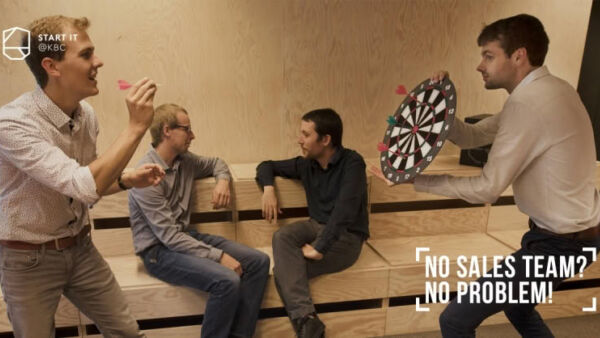How CrazyGames broke the mold, and is growing fast without a sales team

It seems like no matter what book on entrepreneurship you consult, or whatever expert you listen to, they’ll all tell you that getting your sales right is central to your success as a startup. If you don’t grow your sales team, you can’t sell your product or service. Right? Well, someone should have told the Mertens brothers, Tomas and Raf, because their startup CrazyGames is growing like… well… crazy, despite the fact that they don’t have any sales team at all! This online gaming platform is already in the top 1000 most-visited sites in the US, after only five years! And as they got their start at Start it @KBC, we sat down with Raf, to see what their secret was.

From Two-man show, to Thriving Business
“When we started, we were doing nearly everything by ourselves,” Raf starts out. This was tricky, of course, because in any startup, there’s always a thousand things to do that require different skill sets to really excel at. “But this way also has a big upside, which is that you get a much better sense of the scale and scope of the challenges and issues your company faces, so you know what you need to hire later,” he says. It was only after CrazyGames started bringing in outside collaborators, first as freelancers, and then as full-time employees, that they started to grow in a big way. “This can be exciting, of course, but it’s also hard work, because suddenly you have more things to do, and you have to start prioritizing what to work on. In a business like ours, there are usually a lot of different features we could be spending our time building or fixing, and of course, you can work on only one or two at any time, and then you have to test. You don’t always know in advance. But the support and community at Start it @KBC have been a great resource for us in these kinds of early-stage problems.” Although, this is a kind of problem that all startups hope to have!
Like a lot of web-based businesses, CrazyGames has an ad revenue-based business model. But unusually, they have no sales team at all. Raf explains, “For us, it works for two reasons. One is that we have, really, only five clients who account for all our revenue. And these include Google, Amazon, and AppNexus. So we don’t have to cast a huge net.” He goes on to point out that most of the process is algorithmically automated, so there’s relatively little need for human involvement in the sales process. “For every visitor to our site - 10 million uniques per month - there’s an automated bidding process that happens in microseconds, which uses a smart layer we’ve built in-house, and the winner gets the slot. We don’t need to intervene.” And, Raf points out, it’s not that hard to get started, either. “Anyone can register for AdSense, and then as you get more traffic, the others get interested, too. This year, we’re looking at a turnover of more than 2 Million Euro.” Not bad for no sales team!
Growing a global community
Any entrepreneur who starts a platform-based business by this point knows how central your user community is to your success as a company. “We’re really proud of the community we’ve built for CrazyGames, making it to #950 on the Alexa ranking of the most-visited sites in the US. Another fun point is that we’re also the #4 most-blocked site in American schools - Right behind Facebook! Ha!” Of course, Raf acknowledges that this kind of fame might have some drawbacks, but he’s also willing to embrace the upside. “Maybe it means people are playing our games when they should be studying, but it’s also clear evidence that we have strong brand recognition among students in the US. This proves that, even just as a Belgian company, it’s possible to go global right from the start!” Given CrazyGames unique no-sales-team business model, they can keep their office and staff in Leuven, and still serve their clients and community!
Working with Start it @KBC
When Raf came to Start it @KBC, he originally came by himself, before he had a staff. “At that time, I regularly had to describe what I was doing to other people at Start it, which was very helpful, because I was always honing my pitch, and getting constant feedback. It’s a great community here.”
Finally, I asked Raf what were the most important things he had learned since becoming an entrepreneur, and what advice he had for others. He thought for a moment, and then answered, “Well, it’s good to start doing things yourself, so you have a chance to learn them. When you start to hurt a little bit and feel the pressure, that’s when you hire - for that relief. It’s important to prioritize.”
Written by Magali De Reu